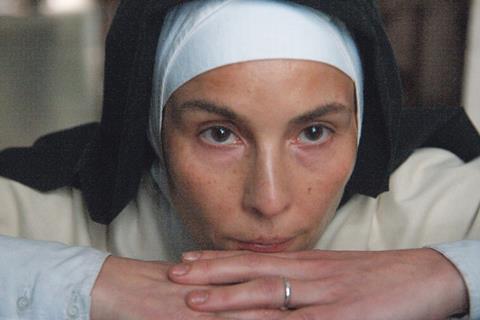Macedonian filmmaker Teona Strugar Mitevska’s punk rock take on the religious figure opens Venice Horizons

Dir: Teona Strugar Mitevska. Belgium/North Macedonia/Sweden/Denmark/Bosnia & Herzegovina. 2025. 104mins
Seeking to create an origin story of sorts for the woman the world came to know as Mother Teresa, Macedonian filmmaker Teona Strugar Mitevska constructs a character study whose frenzied dramatic intensity fails to offer fresh insights into the hallowed, controversial religious figure. Mother stars Noomi Rapace as the Mother Superior over the course of one critical week in 1948 as she awaits news regarding her request to start her own order — a pivotal development that will be threatened by alarming news at the convent she wants to leave. Mitevska invites us to ponder the flesh-and-blood nun, not the blandly saintly public image, but this prickly, sometimes punk-rock take ends up feeling just as one-dimensional.
Mother’s storytelling feels overheated and superficially sensational
Mother is Mitevska’s third straight picture to premiere at Venice, following The Happiest Man In The World and 21 Days Until The End Of The World. She previously made another project about Mother Teresa, the 2010 documentary series Teresa And I, which included interviews with the last living nuns who were part of her order. Opening Venice’s Horizons section, Mother may attract headlines (while angering the faithful) by suggesting that the Catholic saint, who died in 1997 aged 87, could be a calculating, unbending taskmaster who put her own ambitions above all else.
In August 1948 in Calcutta, Mother (Rapace) anxiously anticipates word from the Vatican, hoping she will be given rare permission to launch her own order. The monastery’s Father Friedrich (Nikola Ristanovski) does not want her to leave, convinced that no one could replace her commitment to helping the poor and the young. Mother has a candidate in mind, however: close confidant Sister Agnieszka (Sylvia Hoeks), who she has been preparing for the job. But once Mother discovers Agnieszka’s shocking secret — she’s pregnant — she must decide how to navigate the possible scandal.
Mitevska has expressed a kinship for Mother Teresa, who, like the director, is Albanian and hailed from Macedonia. So her approach to this material is meant to be sympathetic while also critical, insisting on removing the halo from this inspirational figure in order to examine her flaws and unwillingness to compromise. Rapace’s stern gaze works wonders in capturing the character’s severe leadership style, running the convent like a boot camp with herself as the unsmiling drill sergeant. (As we will learn, Mother prefers assigning the sisters numbers rather than always calling them by name.)
The nun’s high expectations for others also extend to herself — she frequently rearranges the furniture in her room, believing that one should never become too comfortable. But Mother hints at the ways in which Mother has not always behaved in a godly manner. There are rumours that her 10-year working relationship with Father Friedrich may have, at one point, crossed into something romantic, and likewise her close bond with Agnieszka has inspired whispers of impropriety. Mitevska, who co-wrote the screenplay, leaves these questions unanswered, but suffice to say that the Mother Teresa we meet in Mother can be petty and play favourites, her unshakeable allegiance to the Almighty justifying (in her own mind, anyway) her periodically cruel or thoughtless actions.
Mother’s opening sound is that of a guitar’s loud power chords, an indication of Mitevska’s brash rejection of piety when portraying Mother, who bristles at the Church’s patriarchy and preaches the importance of an ascetic lifestyle. Fiercely opposed to abortion, Mother must come up with another solution to keep the monastery from finding out about Agnieszka’s pregnancy, which could ruin Mother’s chances to be given her own order.
As Mother is forced to confront the rigid moral certainty she wields over others, there’s potential for a riveting, nuanced exploration of a religious leader whose sterling reputation was criticised by some, who accused her of caring more about ministry than in actually helping the poor. The film hints at these complexities once Mother grapples with what to do about Agnieszka, leading her to wonder whether her religious devotion is as altruistic as she assumed.
Frustratingly, because too much of Mother’s storytelling feels overheated and superficially sensational, Mitevska fails to achieve the bold reconsideration she intends. Flamboyant dream sequences and awkwardly bombastic performances pitch the picture at an operatic tenor that sheds little light on the woman at the script’s centre. The film repeatedly tries to subvert viewers’ impressions of Mother Teresa, daring to make a beloved Catholic figure complicated, even unlikeable. But that strategy would be more successful if Mitevska had sharp ideas to go along with her vaguely provocative tone. Occasionally placing clattering hard rock on the soundtrack isn’t the same as fundamentally rethinking a saint whose messy humanness has rarely been given its due.
Production companies: Entre Chien et Loup, Sisters and Brother Mitevski
International sales: Kinology, Gregoire Melin, gmelin@kinology.eu
Producers: Labina Mitevska, Sebastien Delloye
Screenplay: Goce Smilevski, Teona Strugar Mitevska and Elma Tataragic
Cinematography: Virginie Saint-Martin
Production design: Vuk Mitevski
Editing: Per K. Kirkegaard
Music: Magali Gruselle, Flemming Nordkrog
Main cast: Noomi Rapace, Sylvia Hoeks, Nikola Ristanovski















![[L-R]: Amanda Villavieja, Laia Casanovas, Yasmina Praderas](https://d1nslcd7m2225b.cloudfront.net/Pictures/274x183/6/4/1/1471641_pxl_20251224_103354743_618426_crop.jpg)








